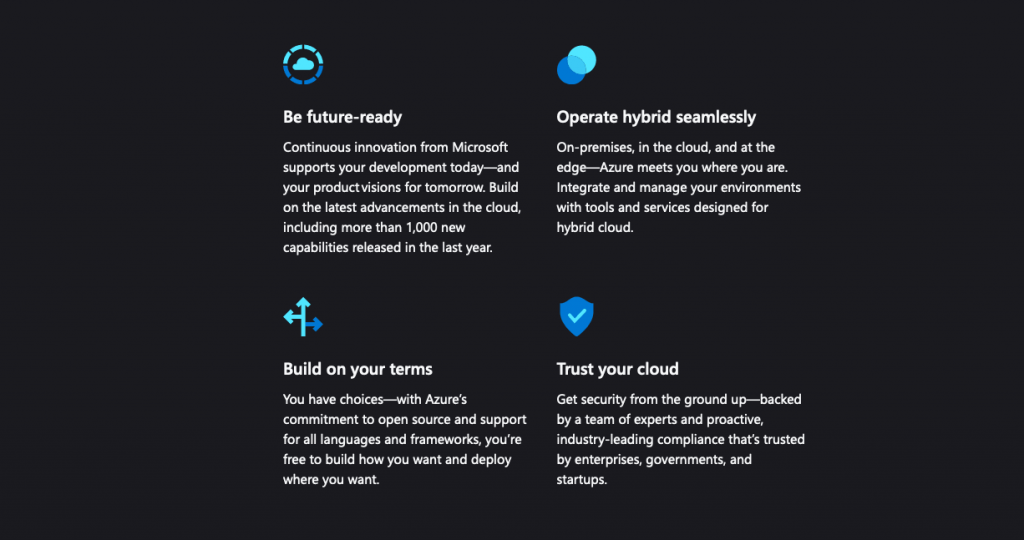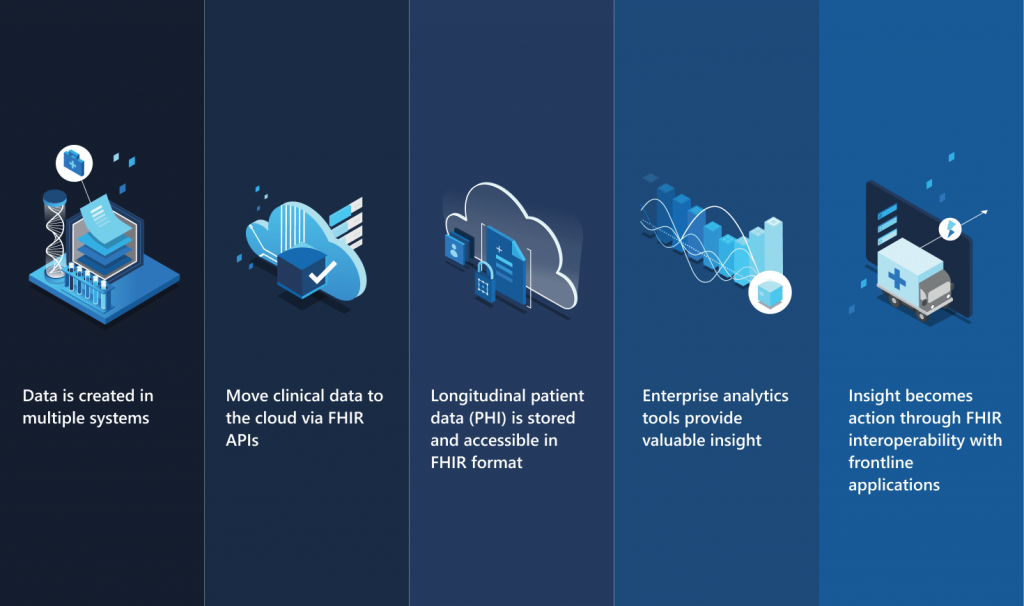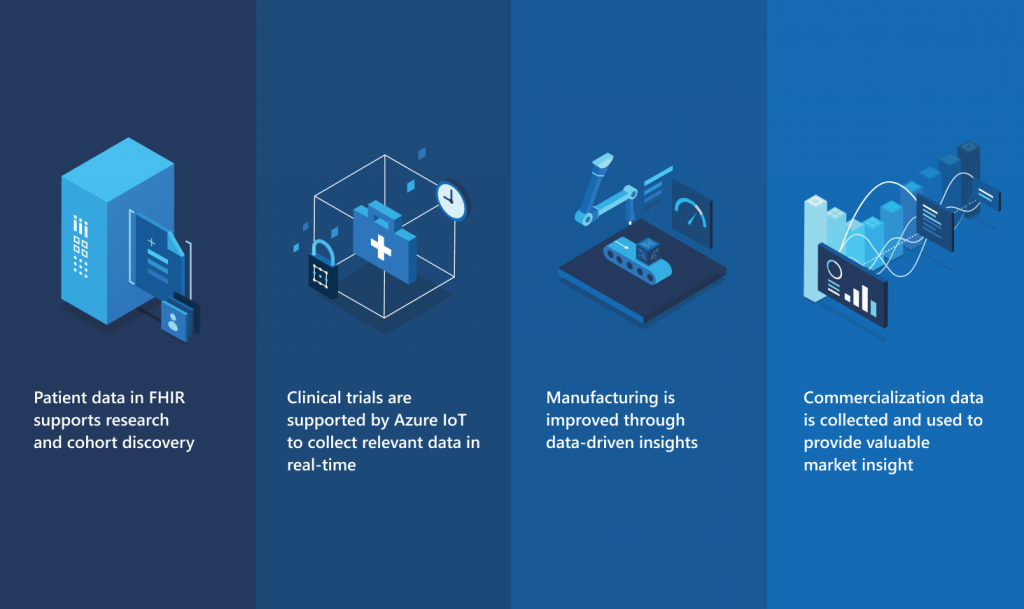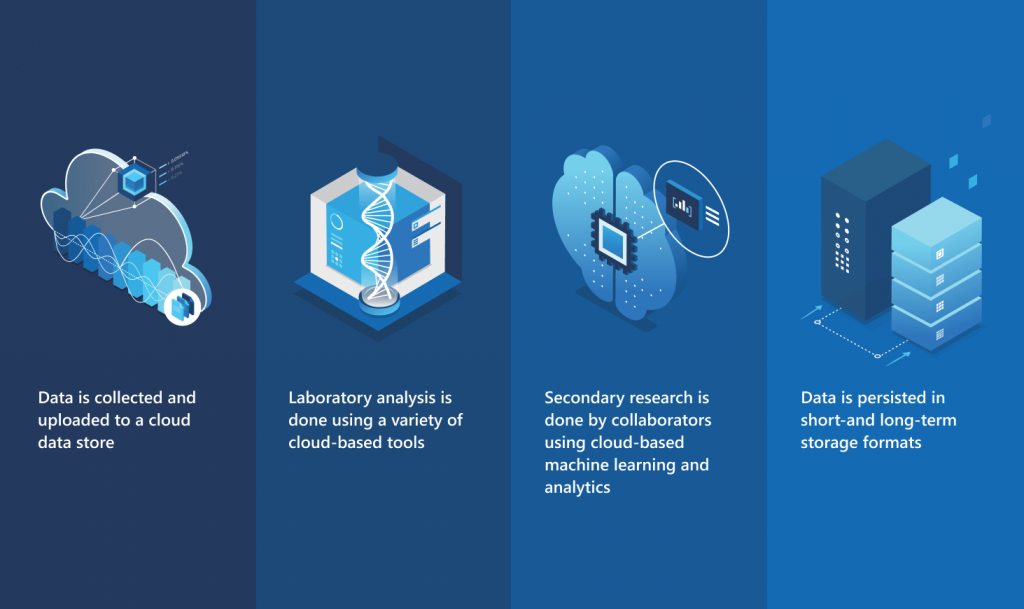Innovation is a driving force in solving the world’s most complex issues in healthcare. The current COVID-19 global pandemic is a testament to the importance of advanced technology to healthcare providers, researchers, and payers. Microsoft Azure can help leaders in the health and life sciences industry gain agility and transform the future of medicine.
What is Microsoft Azure?
Microsoft Azure is an elaborate set of cloud computing services that help your business tackle complex challenges. Azure allows you to build, manage, and deploy applications on an extensive global network using your preferred tools and frameworks. You can pick and choose from cloud services and tools such as compute, analytics, storage, and networking.
Once a business deems Microsoft Azure as their cloud of choice, users can log in to the Azure portal and create cloud-based resources such as virtual machines and databases. Additionally, specific third-party vendors can make software directly available through Microsoft Azure.
Since Microsoft Azure is such a diverse and dynamic service, businesses can decide how they use cloud computing services. Leaders in the health and life science industries are using Azure to shape the future of healthcare. Organizations can transform all aspects of healthcare from symptom checking and triage to fraud prevention and beyond.

Applying Cloud Computing Technology in the Healthcare Industry
Healthcare costs are increasing, making quality care less affordable and less accessible. Research estimates physician burnout at approximately 42 percent, and the healthcare industry is drowning in data. Innovative cloud computing technology services, such as Azure, offer a straightforward solution to these complex issues.
Professionals in the health and life science industries can harness the power of the cloud to modernize environments while reducing costs, scaling the mission, and improving performance. Cloud computing and automation encourage continuous innovation by accelerating, predicting, and managing care.
Azure for health is built on a foundation of trust and can be adapted to fit the specific needs of various healthcare and life science sectors.
Using Azure for Providers and Payers

A healthcare provider is a doctor, facility, or hospital that offers medical services. A healthcare payer is an organization that handles the financial and operational aspects of healthcare, such as insurance plans and provider networks. Both entities can harness the power of Azure.
Providers and payers can achieve interoperability by connecting health data from multiple sources. Providers can create a secure Internet of Medical Things to improve patient outcomes and streamline clinical operations. Analytics, machine learning, and intelligence can develop opportunities for payers to solve complex problems for their policyholders.
Using Azure for Pharma & Biotech

Pharmaceutical companies, otherwise known as pharma, produce medicines that generally have a chemical basis. Biotechnology companies, otherwise known as biotech, produce drugs derived from living organisms. Both entities heavily rely on dynamic research platforms, clinical trials, and manufacturing to provide their services.
Pharma and biotech companies can utilize Microsoft cloud computing to create research platforms that improve the development of essential medical discoveries. Azure services enable researchers to collect and analyze data from multiple modalities to increase the potency of clinical trials. Additionally, Azure can optimize pharmaceutical manufacturing and supply chain management with machine learning and business intelligence.
Using Azure for Omics

Omics refers to a field of study in biological sciences such as genomics, proteomics, or metabolomics. This highly specialized sector of healthcare requires a secure and innovative platform to keep up with its ever-evolving demands. Collaboration, intelligence, and security are a few of the features Azure offers professionals in the omics industry.
Microsoft cloud computing technology can support the most demanding sequencing needs in genomics by running exabyte-scale workloads and utilizing Microsoft Genomics on Azure. Researchers can streamline processes, increase efficiency, and reduce costs while ensuring safety, quality, and integrity.
Benefits of Using Azure for Health
Uncover Possibilities with Cloud Computing
Uncover the possibilities in medicine, find clinical and operational efficiencies, and deliver personalized patient care by using machine learning and advanced artificial intelligence. Supply your care teams with remote and inpatient monitoring solutions to help more patients in more places.
Stay Protected and Update on Security Compliance Requirements
Access a comprehensive set of compliance offerings and simplify your compliance management updates with Microsoft Azure. Azure for healthcare has built-in security controls and advanced threat protection that adheres to strict health and life science compliance standards. You can own and control your data while 3,500 cybersecurity experts are on stand-by to support your needs.
Reduce Costs While Maintaining Quality Care
Adopt intelligent tools and solutions that empower your care team while reducing costs. You can optimize operations, resources, and time allocations to reduce expenses over time.
Distribution of medical devices and the staffing of healthcare professionals enable efficient and affordable healthcare. An efficient healthcare system can substantially improve the quality of care and patient outcomes.
In any case, a Gold Microsoft Partner can help you as a consultant or developer of solutions applied to your organization.





